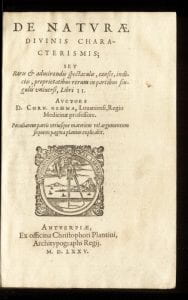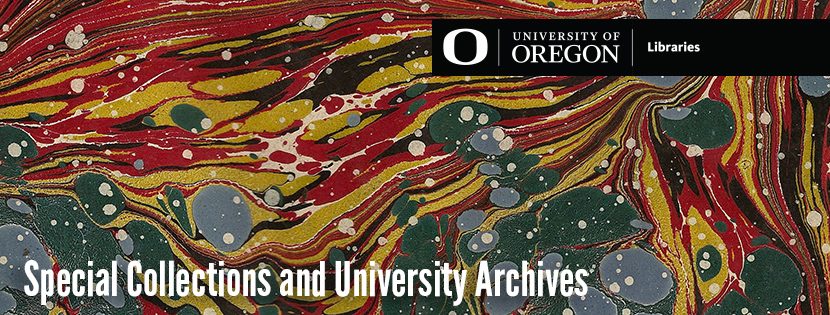New Acquisition: De naturae diuinis characterismis

Cornelius Gemma (28 February 1535 to 12 October 1578) published several critically seminal works concerning topics of medicine, astronomy, astrology, and astrologic medicine. Born in Leuven, Belgium, Gemma’s early roots were in the study of art, however his interests transitioned to medicine, a shift directly influential to his later works in astrologic medicine. Gemma obtained his doctorate of medicine in 1570, succeeding some of the finest scholars of the field (Wikipedia, 2020) Gemma’s concept of astrologic medicine was founded upon the belief that body parts, diseases, and drugs were all in some way associated with the sun, the moon, the planets, and astrological signs (Wikipedia, 2020). In alignment with this theory, Gemma posited that human ailments and disease originated in atmospheric conditions and astral conjunctions (Wikipedia, 2020).
To Gemma, the world was the product of a marriage between the physical and the metaphysical, comprised of the cosmic body, the human body, and the body politic (Boner, 2008). Gemma brought forth a unifying perspective to his work in making sense of the physical world. He writes in De naturae diuinis characterismis, “Just as the three humors in the eye are all appointed to the faculty of a single organ of sight, so the organs of the other senses belong to the full bulk of one body” (Boner, 2008).

Gemma associated cosmic forces with matters of the earth and physical realm (Boner, 2008). Stars had divine properties in their signs that were reflected in nature. University of Oregon Special Collections and University Archives (SCUA) has recently acquired a copy of Gemma’s formative work, De naturae diuinis characterismis; seu, raris & admirandis spectaculis, causis, indiciis, proprietatibus rerum in partibus singulis vniuersi, libri II, in which Gemma elaborates on the relationship of the cosmos to nature, on topics of medicine, and on narratives of unique medical manifestations (Wikipedia, 2020). The work is wide-ranging in two volumes; he incorporates his theories of divine significance in nature and astrological portents into a novel field of science he refers to as “ars cosmocritica.” The text is illuminated by woodcuts, contribution of Antwerp engravers Antoon van Leest and Gerard Janssen van Kampen. De naturae diuinis characterismis; seu, raris & admirandis spectaculis, causis, indiciis, proprietatibus rerum in partibus singulis vniuersi, libri II may be located in the SCUA collection for use.

Both title pages have vignette (printer’s device) with motto: Constantia et labore (Persistence and hard work). Published also under title: Cosmocritice; seu, De naturae diuinis characterismis … Antuerpiae, 1575. Vol. 2 has title: Cornelii Gemmae … De naturae diuinis characterismis; seu, Raris, & admirandis spectaculis in vniuerso, tomus secundus, quem Ianum trifrontem placuit appelliari. Signatures: Vol. 1: A-P⁸; v. 2: a-s⁸ A-B⁸ (last blank). Purchased from Maggs Bros., Ltd.; London, February, 2020. UO Special Collections copy has ownership stamp of An[t or c?]. Maessenhausen at head of title page; bound in contemporary limp vellum, tacket binding, with yapp edges; title handwritten on spine; lacking ties.
Sources
Boner, P.J. (2008). Cornelius Gemma: Cosmology, medicine, and natural philosophy in Renaissance Louvain by Hiro Hirai. Renaissance Quarterly, 63(1), 234-236. https://www.jstor.org/stable/10.1086/652570
Wikipedia. (2020, August 22). Cornelius Gemma. https://en.wikipedia.org/wiki/Cornelius_Gemma
Wikipedia. (2020, June 30). Medical astrology. https://en.wikipedia.org/wiki/Medical_astrology
Written by Alexandra Mueller, Special Projects Archivist

